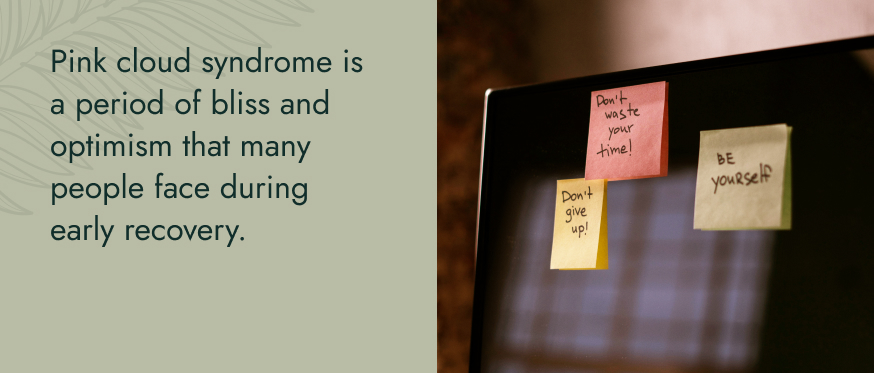Pink Cloud Syndrome


When you first start your recovery journey, you may feel overjoyed, fearless, and unstoppably optimistic about your new way of life. Many people in recovery describe this feeling as floating on a pink cloud, and suddenly, sobriety doesn’t seem so difficult.
While these intense feelings may feel empowering at first, it’s important to understand that they don’t last forever. When the pink cloud begins to dissipate, you’ll start to realize that sobriety is a long-term journey, not a quick fix.
To help you understand what you may experience during the early stages of recovery, let's take a look at what pink cloud syndrome is, how it can jeopardize your recovery, and how you can manage it effectively.
What Is Pink Cloud Syndrome?
Pink cloud syndrome is a period of bliss, euphoria, and optimism that many people face during the early stages of recovery. It usually occurs right after detox or withdrawal, and it can last days, weeks, and even months.
During this phase, it’s common to develop ambitious goals and expectations for a lasting recovery. The intense emotions that you feel at this time can make it hard to imagine that sobriety might ever become difficult to maintain.

What Does Pink Cloud Syndrome Look Like?
If you have pink cloud syndrome, then you may experience:
- Out-of-character confidence
- Fixations on life after recovery
- Extreme positivity on how easy sobriety will be
- Feeling like you don’t need to complete the program
- Depression once the pink cloud goes away
Pink cloud syndrome can be compared to the honeymoon phase of a relationship. In the beginning, everything feels new, exciting, and invincible. As time goes on and these euphoric feelings begin to fade, reality sets in, and with it comes challenges, doubts, and the need for ongoing effort.
Addiction Treatment and Recovery in Mesa, AZ
The treatment team at Sequoia has extensive experience and resources helping those struggling with addiction. Learn more about what substance use disorder looks like and how we treat it.

Where Does Pink Cloud Syndrome Come From?
When you stop using substances, your brain releases a surge of neurotransmitters to rebalance itself. Some of these neurotransmitters, like dopamine and serotonin, are natural “feel-good” chemicals that can make you feel happy, energized, and motivated.
This natural “high” can feel like a dramatic contrast to how sobriety felt during the height of your addiction. Although pink cloud syndrome can seem positive and uplifting, it can actually be dangerous to your recovery.
What Makes Pink Cloud Syndrome Dangerous?
Pink cloud syndrome provides you with a false sense of security. It tricks your brain into thinking that sobriety will be easy, and the hardest days of your recovery are behind you.
This can be dangerous to your recovery for several reasons, including:
- It can cause stress or mental unwellness when challenges occur
- You may push yourself too far and increase the risk of relapse
- You might start to believe you no longer need treatment or support
- It can create unrealistic expectations about what long-term sobriety will feel like
- You may overlook underlying issues that still need to be addressed
- It can prevent you from developing healthy coping skills
When in recovery, it’s always important to remain hopeful and optimistic. However, it’s also important to recognize when that positivity becomes unrealistic or starts to overshadow the work and commitment that recovery truly requires.
Explore our family resources to learn what to expect from treatment.
Can Pink Cloud Syndrome Ever Be a Good Thing?
Pink cloud syndrome can help you find confidence in yourself and inspire hope for change. It can even help you become more receptive to treatment in the early stages of your recovery.
However, the euphoria and optimism that come with pink cloud syndrome are only temporary, and you may feel unprepared for the challenges that you’ll face when these feelings fade. That’s why it’s important to manage these heightened feelings and stay grounded in a realistic understanding of the recovery process.
How Can You Manage Pink Cloud Syndrome?
To manage pink cloud syndrome, you should recognize that the early excitement is only temporary, and it’s important to continue with your treatment. Even if you feel like you can handle sobriety on your own, staying committed to treatment is the key to achieving a lasting recovery.
While in treatment, your mental health and addiction recovery team will provide honest guidance about what lies ahead through psychoeducation. They can help you be mindful of fluctuations in emotions that are coming your way and teach you how to cope with them in a positive way.

Related Blogs

Avoidance Coping: What It Is and How to Stop It
Avoidance coping is a negative coping strategy that causes anxiety by pushing problems away rather than dealing with them.

What to Know About Setting Goals for Treatment
Treatment goals reflect what you want out of therapy. Discover goals to work on in therapy, why treatment goals are important, and how to set them.

What Happens When You Stop Drinking Alcohol?
Knowing what happens when you quit alcohol can prepare you for recovery. Discover the withdrawal symptoms and long-term benefits of quitting alcohol.
Achieve a Lasting Recovery
Addiction is a devastating condition that can leave you feeling hopeless. But with the right treatment and counseling, it can be conquered.
At Sequoia Behavioral Health, our mental health-focused programs are designed to meet you where you are, uncover the sources of the substance abuse, and help you rediscover your life’s purpose. With customizable residential and outpatient options, you’ll receive individualized and comprehensive care that will help you achieve a lasting recovery.
Reach out today to connect with a mental health expert and take the first steps towards a healthier, more hopeful future.
Learn More
Psychoeducation
Psychoeducation helps people learn more about themselves and discover practical ways to overcome mental and behavioral health problems.
Group Therapy
In group therapy, individuals can learn, grow together, and experience meaningful support through psychoeducation, recreation, and community development.
Strength-Based Therapy
Strength-Based Therapy helps people realize their strengths and utilize them to achieve their goals. It focuses on re-framing your perceptions of yourself.
We understand addiction recovery requires support from your loved ones, treatment team, and peers. At Sequoia, we host peer support groups made up of past, present, and future clients to navigate challenges of addiction and mental health struggles.


